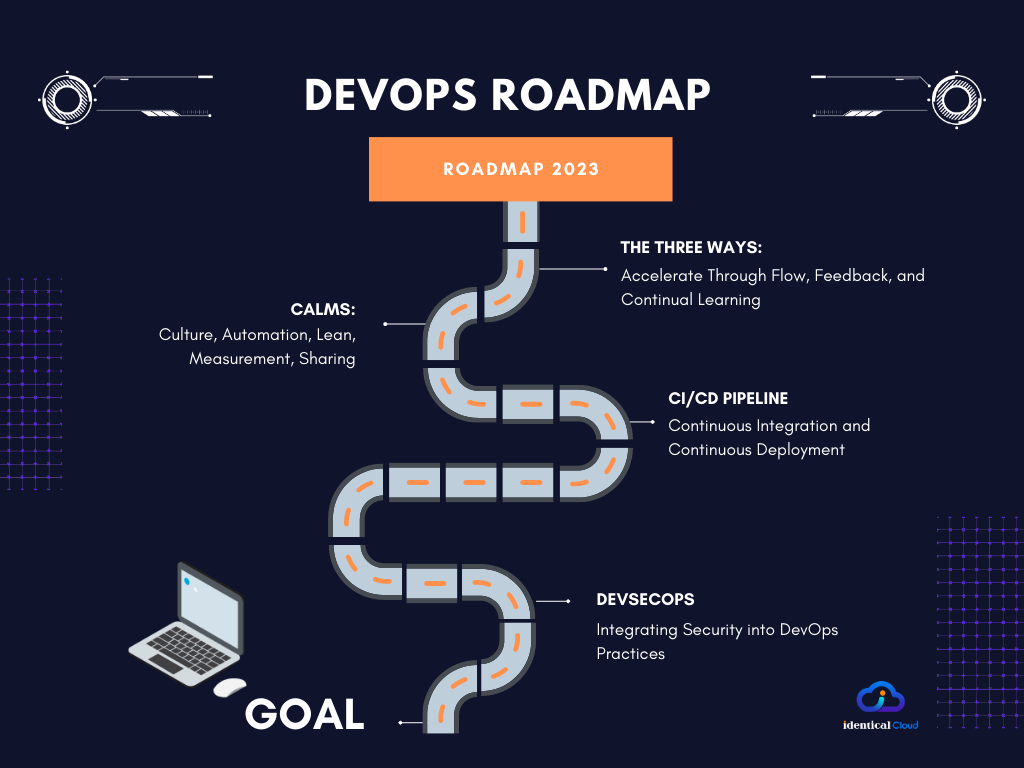
Which DevOps RoadMap is the best for 2023?
Which DevOps RoadMap is the best for 2023?
DevOps is a set of practices that combines software development (Dev) and IT operations (Ops) to shorten the systems development life cycle and provide continuous delivery with high quality. A DevOps roadmap is a plan that outlines the steps that an organization needs to take to implement DevOps practices.
Navigating the DevOps Landscape: Choosing the Best Roadmap for 2023
The world of software development and IT operations is ever-evolving, and DevOps continues to be a driving force behind streamlined processes and efficient collaboration. As we step into 2023, choosing the right DevOps roadmap becomes crucial for staying competitive and achieving success in your projects.
In this blog, we’ll explore various DevOps roadmaps and help you determine the best one to navigate the dynamic landscape of technology and innovation.
Understanding DevOps: A Recap
DevOps is a cultural and technical approach that aims to bridge the gap between development and IT operations. It emphasizes collaboration, automation, continuous integration, and continuous delivery to deliver high-quality software faster and more efficiently.
Choosing the Best DevOps Roadmap for 2023
DevOps roadmaps may vary based on organizational needs, industry requirements, and project complexities.
Here are a few popular DevOps roadmaps to consider for 2023:
1. The Three Ways: Accelerate Through Flow, Feedback, and Continual Learning
Popularized by the book “The Phoenix Project,” this roadmap focuses on three principles:
- Flow: Streamline and optimize the end-to-end workflow, from development to deployment, to ensure faster delivery of features and updates.
- Feedback: Establish a feedback loop to gather insights and make improvements continuously, enhancing collaboration and quality.
- Continual Learning: Encourage a culture of continuous improvement, learning from successes and failures to refine processes over time.
2. CALMS: Culture, Automation, Lean, Measurement, Sharing
This roadmap emphasizes five key aspects of successful DevOps implementation:
- Culture: Foster a culture of collaboration, shared responsibility, and open communication among development and operations teams.
- Automation: Implement automation to streamline repetitive tasks, reduce manual errors, and enhance efficiency.
- Lean: Eliminate waste and optimize processes to improve resource utilization and overall productivity.
- Measurement: Establish metrics and measurements to track progress, identify bottlenecks, and drive continuous improvement.
- Sharing: Encourage knowledge sharing, cross-functional collaboration, and information transparency to enhance teamwork.
3. CI/CD Pipeline: Continuous Integration and Continuous Deployment
This roadmap focuses on creating a robust CI/CD (Continuous Integration and Continuous Deployment) pipeline:
- Continuous Integration: Developers integrate code changes frequently, ensuring early detection of integration issues and reducing conflicts.
- Automated Testing: Implement automated testing at various stages to ensure code quality, reliability, and consistency.
- Continuous Deployment: Automate the deployment process to quickly and safely deliver code changes to production environments.
4. DevSecOps: Integrating Security into DevOps Practices
As security becomes a paramount concern, the DevSecOps roadmap prioritizes:
- Security by Design: Integrate security practices from the start of the development process to identify and mitigate risks early.
- Automated Security Testing: Incorporate security testing, vulnerability scans, and code analysis into the CI/CD pipeline.
- Security Culture: Foster a security-conscious culture by educating teams about security best practices and involving them in risk assessments.
Choosing the Right DevOps Roadmap
The best DevOps roadmap for 2023 depends on your organization’s goals, existing processes, and specific challenges. Consider the following factors when making your choice:
- Organizational Culture: Select a roadmap that aligns with your organization’s values and encourages collaboration and innovation.
- Project Complexity: Choose a roadmap that suits the complexity and scope of your projects, ensuring seamless implementation.
- Resource Availability: Evaluate the resources (technological, human, financial) available for DevOps adoption and consider roadmaps that are feasible within those constraints.
- Industry Compliance: If your industry requires stringent security measures or compliance standards, the DevSecOps roadmap may be a more suitable choice.
Embracing DevOps for a Successful 2023
As you embark on your DevOps journey in 2023, remember that there is no one-size-fits-all approach. The best DevOps roadmap is the one that aligns with your organization’s goals, values, and priorities. Whether you choose to accelerate flow, emphasize security, optimize your CI/CD pipeline, or focus on a holistic approach, the key is to foster a culture of collaboration, continuous improvement, and innovation.
By selecting the right DevOps roadmap, you’ll pave the way for success, adaptability, and growth in the ever-evolving landscape of technology and software development.
